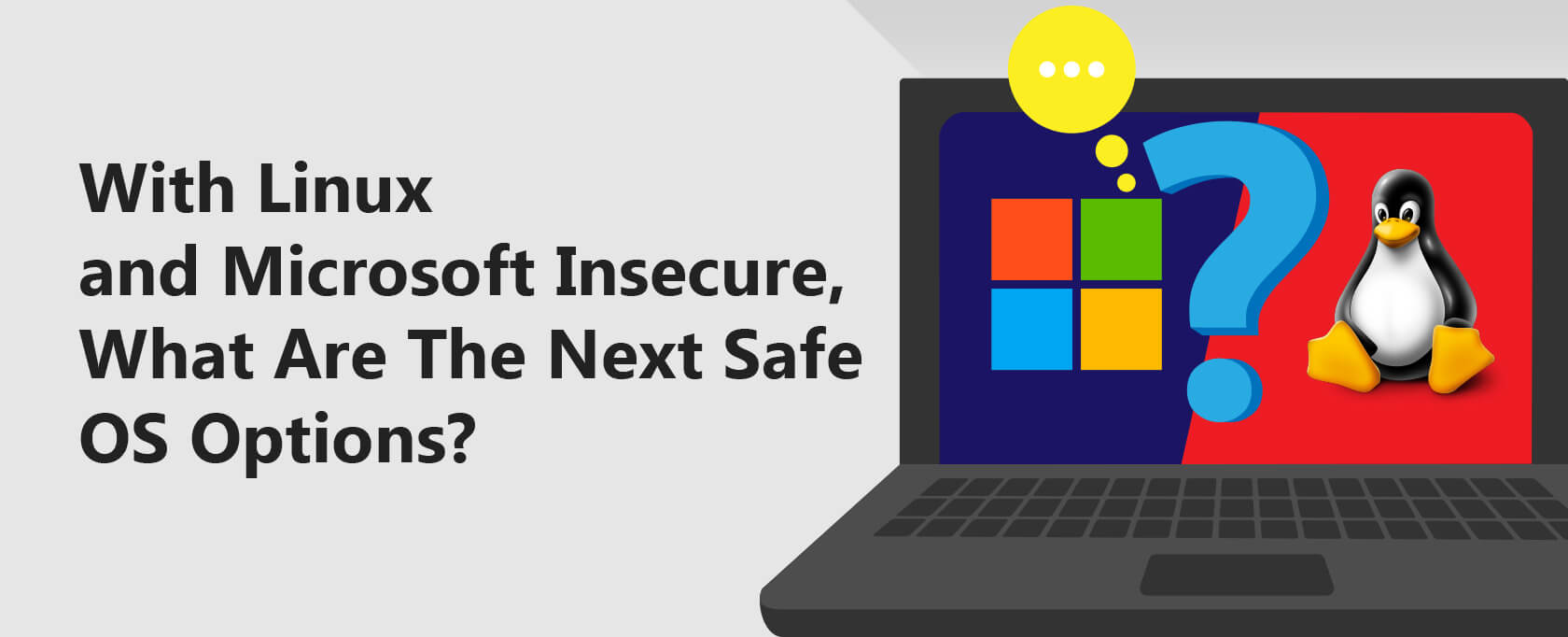With Linux and Microsoft Insecure, What Are The Next Safe OS Options?
Your OS is the basic building framework on which your device’s operations rely. It not only controls the software, memory, and processes within your device but is also responsible for the stable working of the hardware present within it.
It is, therefore, crucial to have a secure and updated OS otherwise, you could come across a plethora of privacy and security issues such as:
- Contacting a malware infection
- Disrupted device functionality
- Increased possibility of hack attacks
However, some of the most popular OS options, Windows and even Linux, are quickly becoming vulnerable, and it is best to search for safer solutions amidst this.
Despite their strong reputations, these systems are increasingly vulnerable to malware and other security threats.
macOS, while generally perceived as more secure, also faces its share of vulnerabilities. In contrast, virtual operating systems like Tails, Qubes, and OpenBSD are gaining recognition for their advanced security features.
Given that no single OS can be deemed universally the most secure, the best approach to enhancing online safety is to keep operating systems up-to-date and to implement additional security measures.
Is Linux as Secure as it is Known to Be?
Linux is by far one of the most exciting OS known for its security and privacy. Developed around 30 years ago, it is not a popular choice of developers, ethical hackers, and privacy advocates for the security it provides.
However, despite the OS’s heat, its notoriety regarding the security it ensures almost seems superficial. Primarily while considering the amount of vulnerabilities Linux systems have come across in the past few years.
The Linux system has become highly vulnerable to malware attacks in the last few years.
A recent threat report reveals more than thirteen attempted malware attacks on the Linux system between January to August 2021 alone.
Such researches highlight how vulnerable the once secure system has become. Some of the most common types of Linux attacks observed are:
- Cryptominers, which make up to be 25% of the attacks
- 20% of attacks that occur were web shells.
- 12% of attacks are ransomware such as DoppelPaymer, RansomExx, DarkRadiation, and DarkSide.
The rising influx of these attacks may partly result from Linux users and cybercriminals assuming Linux as the safest OS.
Since 2016, Linux has been under special consideration from cybercriminals, and the system has faced a massive influx of attacks.
The problem remains that Linux relies on various ethical hackers to discover the system vulnerabilities and patch them as an open-source system.
Therefore, there are no timely releases and patch issues by the OS, which would allow its users to stay up-to-date and informed.
How Secure is the Windows Security Structure?
Windows has been around since 1985, and although the OS has faced much evolution and is now significantly developed, it does not hold this reputation as the most secure OS.
Admittedly the Microsoft team is somewhat vigilant about the prevailing vulnerabilities present within the OS and releases monthly patches every Tuesday.
And although these published patches are useful for the people, it somewhat tarnishes Widnows reputation for having too many vulnerabilities.
Research in 2020 highlights how Microsoft’s total number of vulnerabilities has risen by 48% compared to 2019.
The situation seems alarming as Microsft has managed to secure a top place by vendor publishing 1,188 security vulnerabilities in 2020 alone. The situation in 2021 remains somewhat similar.
When looking at the Windows 10 record for Microsoft, the drop in published vulnerabilities is evident, with the number going down to 256.
However, while looking into the average Common Vunerbaiuties and Exposure critical rating (CVE), in 2021, the rate is more significant than in 2020. Some of the most commonly observe attacks on Windows 10 alone are as follows:
- Remote code execution vulnerability
- Privilege access vulnerabilities
- EoP vulnerability leading to rootkit malware
Arguably, the rapid increase in Windows vulnerability is because the Windows Operating System is a large project.
And with such large-scale work, there are bound to be flaws that cybercriminals look for to exploit.
However, the problem is not that there are mere flaws within the system; instead, the flaws happen to be critical.
Any cybercriminals who manage to exploit those flaws before the monthly Tuesday patch wreaks havoc.
Moreover, with Windows being a popular choice due to its ease within homes and offices, the system is easy to overlook easily.
What is the Next Best Safe OS Option?
With the two most popular OS vulnerable to threat actors, it is about to try and get a secure OS. Most people consider MacOS a relatively safer option.
The year 2021 has not been good for MAC either, which has faced a total of 221 vulnerabilities and an increase in CVE score by 0.03%.
Nevertheless, in comparison to Windows and Linux, macOS has become more secure, which can’t be overlooked.
Moreover, Apple’s System Integrity Protection (SIP) has managed to secure macOS from the worst cyber-attacks.
So when it comes to regular use, macOS does seem relatively secure for use.
However, for privacy advocates, things do seem bleak. At the same time, they can either take a risk and work through regular security patches and security tools or switch to using virtual OS.
So far, virtual OS have rising popularity due to the security and privacy they offer.
Some of the most popular ones, such as Tails, Qubes, or even OpenBSD, are increasing in popularity amongst tech-savvy users due to their unexceptional security features.
From isolated working environments to keeping absolutely no trace of data and even going as far as protecting information through encryption, it seems as if virtual OS might be the norm in the upcoming future.
However, until then, the best safest option is to try and work with what we have in Windows, Linux, or macOS or be bold enough to use a virtual OS.
Final Words
Attaining online privacy and security within the rising threat landscape is nothing less than a war. With cybercriminals looking to exploit even the most minor vulnerabilities, staying secure online has become an arduous task.
Amidst this, the best possible answer to attaining security is to scramble to try and put on the best armor we have.
The best action is to keep an updated and secure OS and ensure additional device security through various security tools.
Since the combination of both seems to be the only way we can attain even a mere speck of security.



2 Comments
pcda
May 5, 2023 9:57 pm
Typo issue that completely changes an important sentence: re linux, it says, “it is not a popular choice of developers, ethical hackers, and privacy advocates for the security it provides.” Obviously, there’s a “not” that somehow got typed in, when it shouldn’t have been.
Bob
November 20, 2021 6:02 pm
Android on servers and workstations!
;P